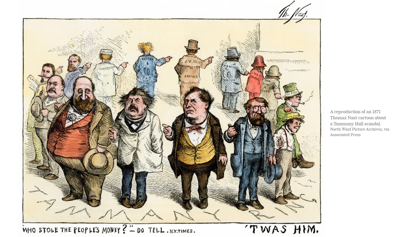At the moment there’s a provisional agreement that the equity will be distributed as follows
20 H
20 RW
20 TB
10 Jim
10 held by H for the big guy
— James Gilliar’s May 13, 2017 email to Tony Bobulinski, cc: Rob Walker, Hunter Biden
IN 1919, after visiting Lenin’s Marxian Russia, the American journalist Lincoln Steffens proclaimed that he had seen the future, “and it works.” Like many well-meaning leftists at the time, he believed that Soviet Russia was enduring “a temporary condition of evil, which is made tolerable by hope and plan.” Evil, however, turned out to be a permanent and basic feature of Marxism-Leninism (and its variants) whose hopes and plans were imaginary if not delusional.
Before he became a pinko, however, Steffens was an enterprising journalist who investigated corruption in St. Louis, Minneapolis, Pittsburgh, Philadelphia, Chicago, and New York City. In 1904, his collection of articles was published in a book titled, “The Shame of the Cities.” It is still a good read.
“I heard,” he wrote, that “the American people won’t ‘stand for it,’ ” referring to government corruption. They also said, “You may blame the politicians or, indeed, any one class, but not all classes, not the people. Or you may put it on the ignorant foreign immigrant, or any one nationality, but not on all nationalities, not on the American people.”
And yet, Steffens said, “no one class is at fault, nor any one breed, nor any particular interest or group of interests.”
“When I set out on my travels,” he added, “an honest New Yorker told me honestly that I would find that the Irish, the Catholic Irish, were at the bottom of it all everywhere. The first city I went to was St. Louis, a German city. The next was Minneapolis, a Scandinavian city, with a leadership of New Englanders. Then came Pittsburg, Scotch Presbyterian, and that was what my New York friend was. ‘Ah, but they are all foreign populations,’ I heard. The next city was Philadelphia, the purest American community of all, and the most hopeless. And after that came Chicago and New York, both mongrel-bred, but the one a triumph of reform, the other the best example of good government that I had seen. The ‘foreign element’ excuse is one of the hypocritical lies that save us from the clear sight of ourselves.”
Take note that in the early 20th century, Chicago and New York were the “reformist” cities. (Chicago and New York!)
Concerned citizens back then were already saying, “Give us a business man…. Let him introduce business methods into politics and government….”
But according to Steffens, “There is hardly an office from United States Senator down to Alderman [municipal council member] in any part of the country to which the business man has not been elected; yet politics remains corrupt, government pretty bad…. When a business man…learns the business of politics, he is a politician, and there is not much reform left in him. Consider the United States Senate, and believe me.”
For Steffens, “The misgovernment of the American people is misgovernment by the American people.”
“We are responsible,” he said, “not our leaders, since we follow them…. We break our own laws and rob our own government…. The spirit of graft and of lawlessness is the American spirit.”
“The people are not innocent,” he reiterated. “That is the only ‘news’ in all the journalism of these articles….”
The titles of some of his articles:
“The Shame of Minneapolis”
“The Shamelessness of St. Louis”
“Pittsburg: A City Ashamed”
“Philadelphia: Corrupt and Contented”
Steffens said his articles were an “understatement”: “I cut twenty thousand words out of the Philadelphia article and yet I had not written half my facts. I know a man who is making a history of the corrupt construction of the Philadelphia City Hall, in three volumes, and he grieves because he lacks space. You can’t put all the known incidents of the corruption of an American city into a book.”
Here’s a sample of American corruption back in the day as recounted by Steffens:
In St. Louis, Mo., the legislative power was vested in a Municipal Assembly which consisted of a council and a House of Delegates, several of whose members, according to a grand jury, were “utterly illiterate and lacking in ordinary intelligence, unable to give a better reason for favoring or opposing a measure than a desire to act with the majority. In some, no trace of mentality or morality could be found; in others, a low order of training appeared, united with base cunning, groveling instincts, and sordid desires. Unqualified to respond to the ordinary requirements of life, they are utterly incapable of comprehending the significance of an ordinance, and are incapacitated, both by nature and training, to be the makers of laws.” Not surprisingly, “with few exceptions, no ordinance has been passed wherein valuable privileges or franchises are granted until those interested have paid the legislators the money demanded for action in the particular case…. So long has this practice existed that such members have come to regard the receipt of money for action on pending measures as a legitimate perquisite of a legislator…. [N]othing was passed free of charge.”
But wait. There’s more.
“From the Assembly, bribery spread into other departments. Men empowered to issue peddlers’ licenses and permits to citizens who wished to erect awnings or use a portion of the sidewalk for storage purposes charged an amount in excess of the prices stipulated by law, and pocketed the difference. The city’s money was loaned at interest, and the interest was converted into private bank accounts. City carriages were used by the wives and children of city officials. Supplies for public institutions found their way to private tables; one itemized account of food furnished the poorhouse included California jellies, imported cheeses, and French wines! A member of the Assembly caused the incorporation of a grocery company, with his sons and daughters the ostensible stockholders, and succeeded in having his bid for city supplies accepted although the figures were in excess of his competitors’. In return for the favor thus shown, he indorsed a measure to award the contract for city printing to another member, and these two voted aye on a bill granting to a third the exclusive right to furnish city dispensaries with drugs.”
Payrolls were padded with the names of non-existent persons, and bribery was a joke.
“A newspaper reporter overheard this conversation one evening in the corridor of the City Hall:
“ ‘Ah there, my boodler!’ said Mr. Delegate.
“ ‘Stay there, my grafter!’ replied Mr. Councilman.
“ ‘Can you lend me a hundred for a day or two?’
“ ‘Not at present. But I can spare it if the Z—— bill goes through to-night. Meet me at F——‘s later.’
“ ‘All right, my jailbird; I’ll be there.’ ”
Ah, democracy.
Send feedback to editor@mvariety.com
















